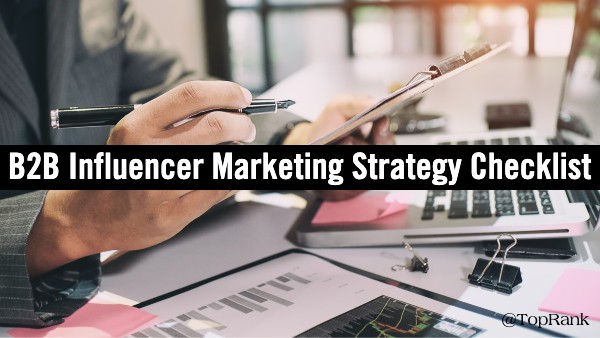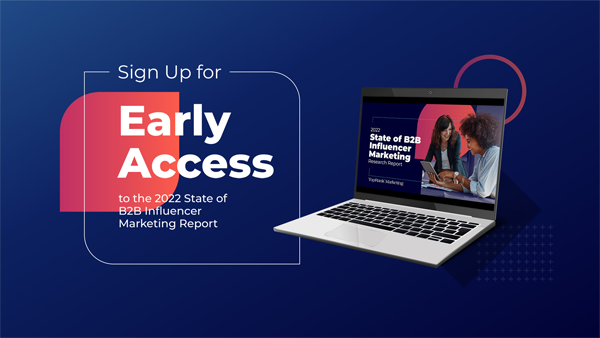[ad_1]

Did you know? 48% of B2B marketers say their top challenge with B2B marketing is a lack of a documented strategy. And no wonder: 53% of B2B marketers either do not have a strategy or it’s not documented. (2022 State of B2B Influencer Marketing Report)
While influencer marketing for B2B brands has gained momentum and popularity, a lack of strategy is recipe for disaster. Of course no company can have all the answers right away, but working with influencers in a way that creates a positive impact on the business requires a unique approach.
If there is an expectation that partnering with influencers will advance marketing and business goals, key questions need to be answered. Who are the right influencers? How do you get the influencers to work with your brand? What kinds of influencer engagement and activations work best? Will the influencers be paid? If so, how much? What kind of content is best for the influencers you’ve selected? How will you know which influencers are effective? How will you measure success of the activations?
The good news is that at TopRank Marketing, we’ve been answering these questions for top B2B brands for nearly 10 years. From recruiting tech influencers to write ongoing content for a global computer company to nurturing a community of over 100 influencers for one of the top social networks, we’ve had the opportunity to be a guide, a catalyst and coach for B2B companies big and small on how to create identify, engage and activate the most relevant influencers to collaborate on content that drives measurable business outcomes.
An important part of that process is addressing the important questions that help develop a strategy. Whether a B2B company already knows that partnering with the most trusted voices in the industry needs to be an essential part of their marketing and thought leadership or a pilot campaign is being used to test the waters of influence, a strategy will improve the chances of success significantly.
So what are those key considerations for developing a B2B influencer marketing strategy? Here’s a checklist:
What business or marketing problem can we solve by working with influencers?
Far too often, B2B marketers gloss over the “why” with expectations borrowed from advertising or oversimplify with goals like, generate more leads. The trick is to assess the situation and make an appropriate decision about approach. Ultimately all companies want to grow revenue and influencers can play a part – don’t expect them to be some kind of magic wand for leads though.
Whether your B2B brand wants to create more trust and credibility in a market where you are a challenger brand or are launching a new product or you want to ensure your leadership position by partnering with the most trusted voices in the industry to drive conversations about the key issues and solutions in the industry, influencers can play an important role.
What topics do we need to be influential about to achieve our goals?
One of the most important first steps to document in a B2B influencer marketing strategy is what topics sit at the intersection of how the brand wants to be known, what customers care about and the conversations influencers are driving in the marketplace. Once those topics are identified, then further research into understanding the demand of the specific phrases through SEO or social data can help boost influencer content effectiveness.
Basically, what do you want to be influential about? Find influencers for those topics that we know customers are actively searching for and talking about. Then collaborate on content about those same topics. Everybody wins.
Which influencers are right for our business? For our customers? For our specific use case?
Many B2B marketers are still intoxicated with the juice of popularity thinking that fame equals effectiveness. If anything, we’ve learned over the past 10 years that popularity is just one dimension of what makes a great influencer partner. Topical relevance and resonance with the audience you want to influence are just as important and in some cases even more important than popularity. Beyond those audience metrics, it’s important that influencers and brand are aligned in style, messaging and values. No one wants to engage an influencer only to find they have controversial political agendas that are contrary to what the brand stands for. Due diligence in influencer selection and qualification is essential.
What value will we create for influencers?
The most common mistake B2B brands make with influencer marketing is thinking of influencer engagements as one sided – what’s in it for the brand. Influencer Marketing is a relationship business and we all know if relationships are one sided, they’re not going to work very well. A big part of activating influencers effectively is having a process for understanding what motivates them and making that motivation a key part of activating them. Is it money alone? Does the topic align well with passion for the influencer? Is exposure in partnership with the brand enough?
What technology will we use to identify, engage and measure our influencer marketing?
Our research for 2022 discovered that finding the right influencers is one of the things B2B companies outsource most to specialist influencer marketing agencies. A data informed approach to influencer selection requires technology and thankfully, there are an increasing number of influencer marketing platforms that can be used for influencer identification, ongoing communication and program measurement. You can Google “b2b influencer marketing software” and find quite a few options.
What activation and content type are most effective for our objectives?
Like all marketing disciplines, there are different levels of sophistication when working with B2B influencers. Once you’ve identified the topics that matter most to your brand and customers, those same topics will be used to find the right influencers. One of the criteria for selection is being able to find influencers with skills at creating the kind of content you plan on using. Here are a few examples:
- A thought leadership program might call for a research report so inviting influencers with industry thought leadership status to contribute their expertise to the report is a good match.
- If you’re starting a new podcast or video series, an influencer that has already hosted, produced or been a guest on many podcast/video shows makes the most sense.
- For lead generation programs intended to activate influencers to make recommendations, it’s essential that influencers that already have a history of brand, product or category advocacy are engaged. Otherwise their audience will not trust this new brand they’ve started talking about.
Should we pay influencers?
There are a number of important considerations when deciding whether exposure or some other organic form of value exchange is appropriate or payment with influencers. If you expect the influencer to perform work, you should expect to pay them. If you don’t have any relationship with influencers you want to partner with and they are professional influencers, you should expect to pay them. Small asks like quotes for an article are typically not paid. Writing an article, hosting a webinar, speaking at an event and promoting all of these activities via social are often paid.
No matter what size of program from pilot to Always On, it’s a good idea to have some budget for either paying influencers or for ad spend to promote the content they collaborated on.
How will we measure influencer success?
Throughout the influencer marketing engagement, there are key metrics for your team to measure to ensure you are moving in the right direction, efforts are effective and the overall program a success. These measurements include your win rate at securing influencers to participate, the effectiveness of the resulting activation whether it’s content that is part of a campaign, an event or an ongoing relationship where organic social interaction is expected. You’ll also want to measure the advancement of the relationship with influencers – think of a spectrum of unaware of your brand on the left to advocate on the right.
Using influencer marketing software can help measure expected outcomes with a specific group of influencers that you are working with: shares, social engagements, traffic to influencer content and even SEO metrics in terms of ranking and organic search referrals.
While it can seem like a lot, B2B influencer marketing experts can take care of a lot of the heavy lifting. You can also get a sense for what peers are doing in the industry through research. Luckily TopRank Marketing offers both and we’ll be releasing our 2022 State of B2B Influencer Marketing Research Report soon.
GET CAN GET ADVANCED ACCESS to the 2022 State of B2B Influencer Marketing Research Report by signing up here.
[ad_2]
Source link








